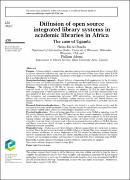| dc.description.abstract | Purpose:
Libraries globally automate their operations and services using integrated library systems (ILS) to increase operational efficiency and meet the ever-evolving demands of their users. Open source ILS (OS ILS) has become more popular globally. The purpose of this paper is to better understand the diffusion of OS ILS in academic libraries in Uganda.
Design/methodology/approach:
Rogers’ diffusion of innovation (DoI) supplemented by the fit-viability theory was used as a theoretical framework. A questionnaire was developed based on extant literature and distributed electronically to representative members of a Ugandan university library association.
Findings:
The diffusion of OS ILS in Ugandan academic libraries approximates the S-curve expected based on DoI. Ugandan academic libraries are adopting OS ILS for more flexibility to meet changing needs at what is perceived as an affordable cost but not all are fully satisfied. Koha is the most adopted OS ILS and is also being considered by all libraries without any ILS or a proprietary ILS. The information and communication technology (ICT) infrastructure, organizational procurement policies and national procurement legislation, human resource capacity and limited finances are barriers to diffusion. The total cost of ownership and technical skills required are of particular concern for OS ILS.
Research limitations/implications:
The research was limited to a single African country and the recommendations may not be transferable to other African countries. Future research can expand the survey, the countries studied and/or address the methodological limitations of this study.
Practical implications:
When embarking upon library automation using OS ILS or migrating to an OS ILS solution libraries should consider their ICT infrastructure, local support community, available training and be realistic about the costs. Local library associations should provide guidance on OS ILS selection, ongoing training, and opportunities for knowledge sharing. LIS schools should consider expanding their curriculum to include library automation and, in Uganda incorporate training on Koha as OS ILS. Libraries and library associations should advocate to reduce restrictive organizational procurement policies and national procurement legislation.
Originality/value:
Studies on country-level diffusion of ILS are comparatively few, particularly in African countries. This is the first country-level study of OS ILS diffusion in Uganda. This study can positively impact future patterns of diffusion for optimal deployment of OS ILS software by informing academic libraries, university management, library association, LIS schools, and policymakers in Uganda and across the African continent, and encouraging academics and researchers to teach and study library automation using OS ILS. | en_US |

